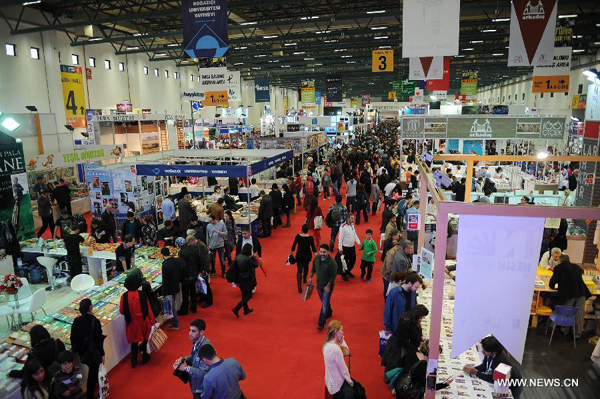 |
|
People visit the 32nd International Istanbul Book Fair in Istanbul, Turkey on Nov. 3, 2013. Opened on Saturday Nov. 2, the 32nd International Istanbul Book Fair attracted more than 650 publishers from 40 countries and regions to attend the nine-day book fair. China is the country of honor for the event. (Xinhua/Lu Zhe)
|
As part of an International Book fair taking place in the Turkish city of Istanbul, Chinese publishers and writers have been discussing how to more effectively make Chinese books more universally accepted.
CRI's Jordan Lee has more.
Although more and more Chinese literary works are being translated into foreign languages, there are still many difficulties in getting Chinese books onto the mainstream global market.
Jing Xiaomin works with China Intercontinental Press, a leading Chinese publisher specializing in translating Chinese books into foreign languages.
"The amount of foreign readers who are interested in Chinese books is not much. The small circulation leads to higher costs comparing to domestic publishing, which harms the enthusiasm of Chinese publishers. So we need government support for going out."
Bai Bing, Chief Editor of China's Jieli Publishing House, says Chinese publishers need to do better when it comes to communicating with their foreign colleagues.
"For example, we can introduce Turkish writers and their works in most influential Chinese literary magazines and vice versa. Such a long-term communication and understanding is the precondition of copyright business."
One of the biggest challenges is the variations of the languages itself.
Nermin Mollaoglu is a Turkish literary agent.
"I wish we have more books translated from Chinese into Turkish, but I think the big problem is we don't have enough translators from Chinese into Turkish and other way around. So we need to have more and more translators, and we have to invest for this translation. And after this translation, Turkish people will discover modern Chinese literature."
The guest of honor at this year's Book Fair in Istanbul is Wu Shulin, the deputy director of China's General Administration of Press, Publication, Radio Film and Television.
"It is a good opportunity to intensively display the culture of a country. So it is a notable platform for cultural exchanges nowadays. Only when you go outside, exchange or even clash with others, you can have your own position."
In the end, Chinese writer Liu Zhenyun says the key to having Chinese literature become more popular abroad is to ensure the writing is solid.
"For Chinese writers, the most important thing is dedicating to their next works. The best way for the world to accept us is not simply going out, but sitting in front of the desk and producing good works."
We recommend:
